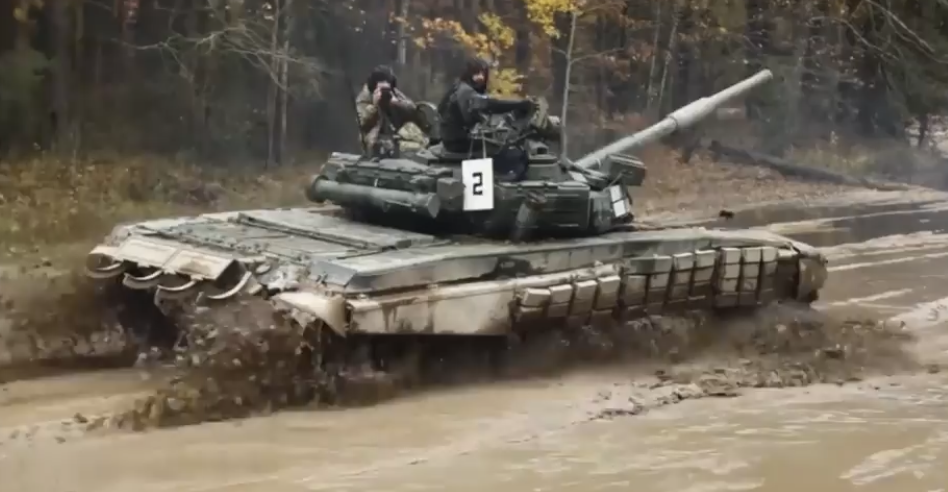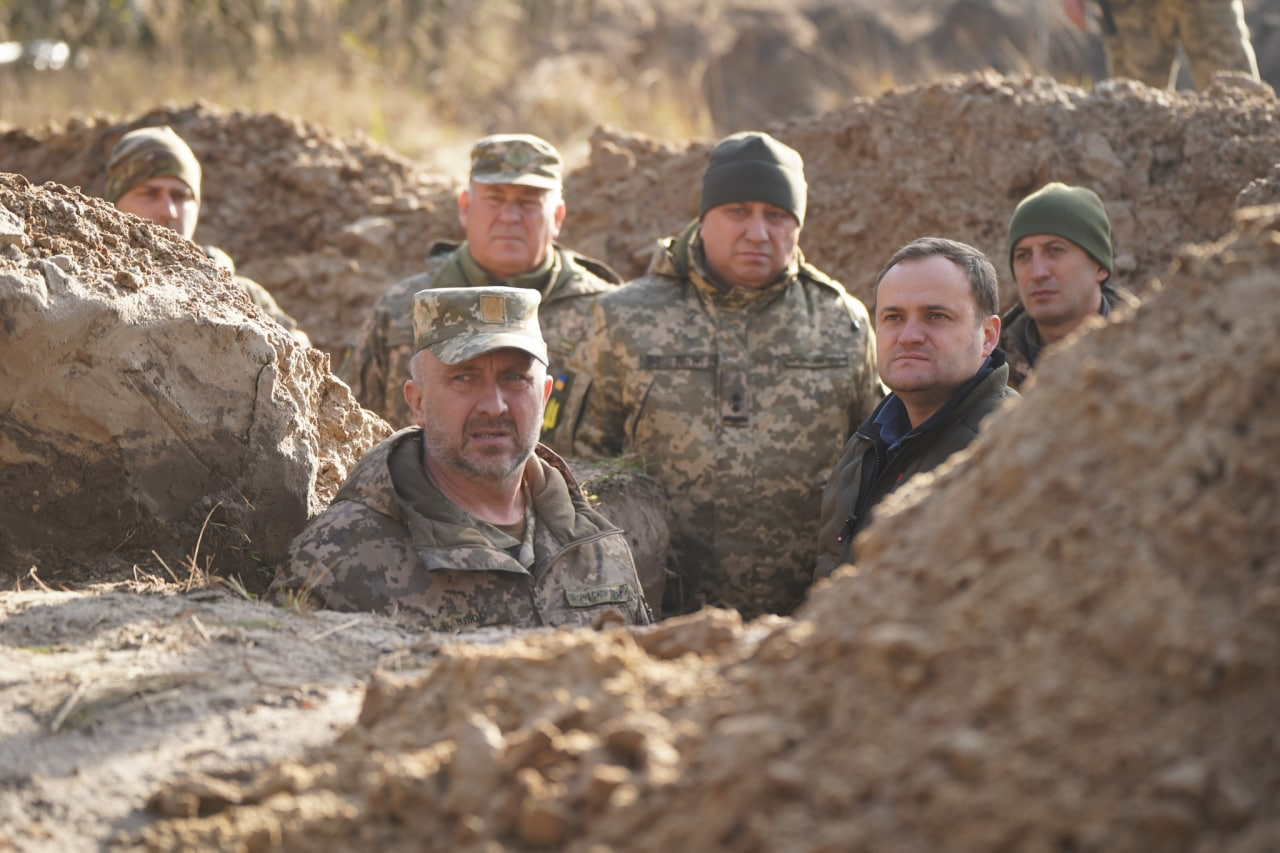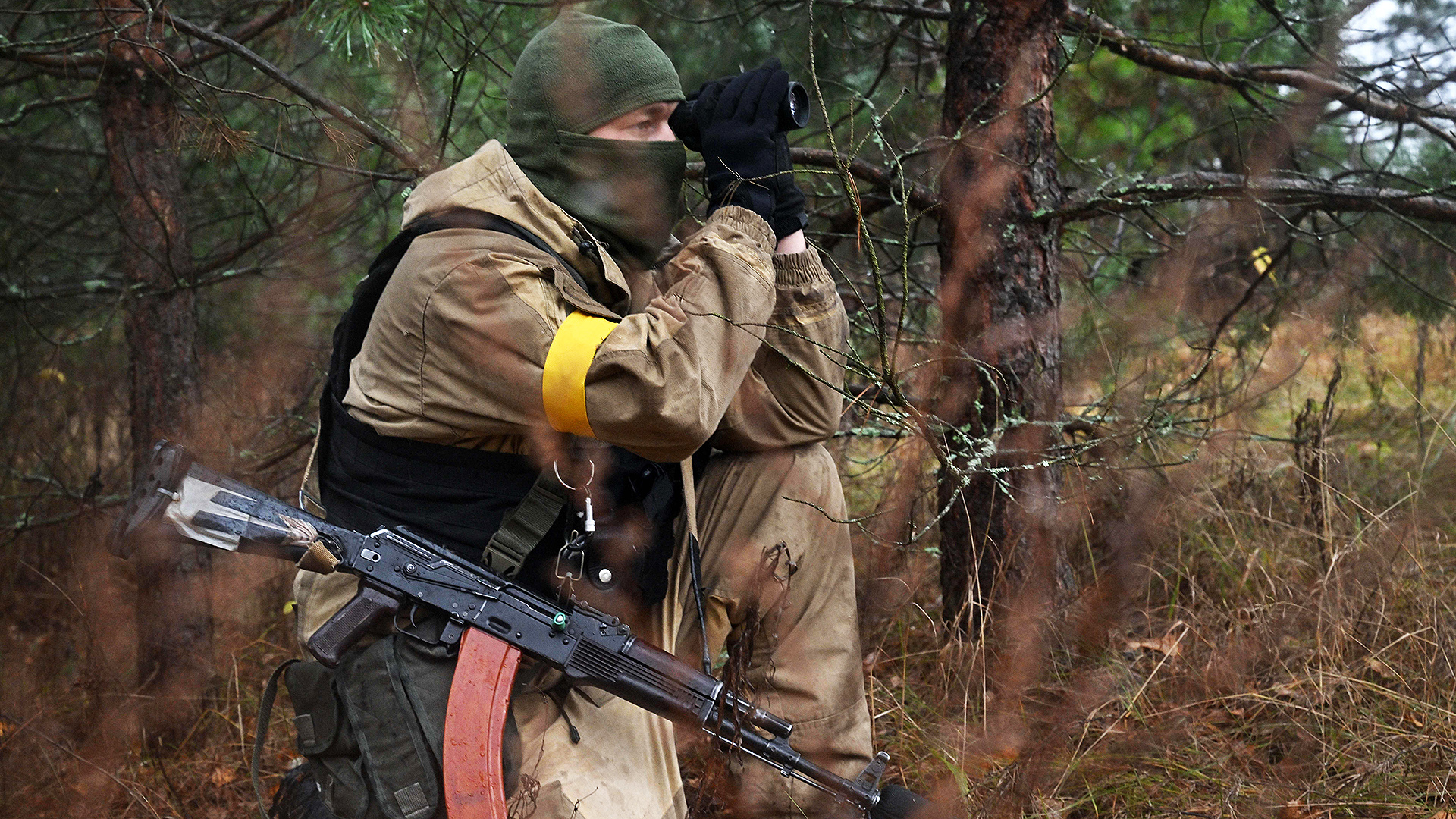Despite expending tremendous resources on ongoing counteroffensives in the south and east, Ukrainian officials on Wednesday talked about how they continue to prepare the northern border with Belarus, and Kyiv itself, against the potential for an attack.
Ukrainian Northern Group soldiers “are preparing for active defense in the event of a repeated attack by the Kremlin invaders from the territory of the Republic of Belarus and the Russian Federation,” the Ukrainian Ministry of Defense (MOD) said Wednesday. “We will no longer wait for the enemy in the trenches. Active fire damage for the occupiers will begin from the moment they cross the state border with Ukraine, our defenders assure.”

Highways, forests and settlements “will become a trap for the enemy,” Ukraine’s MOD said. “All possible methods of action will be used to repel possible aggression from the ‘neighbors.’”
During the initial phase of Russia’s all-out invasion of Ukraine, Russian troops came down from the north through Belarus. But their long line of vehicles famously got bogged down thanks to poor planning, poor training, and poor logistics and was picked off by Ukrainian attacks.
More recently, drone attacks have been launched against Ukrainian cities from Belarus.
Still, though an attack from the north seems unlikely, Ukraine is unwilling to chance having any such incursion get as far as it did in February. It is unclear at the moment how many Russian troops are in Belarus, how well-equipped they are, or even exactly why they are there.
Those troops began arriving after Oct. 10, when Belarusian President Alexander Lukashenko announced that he and Russian President Vladimir Putin agreed to deploy a regional group of forces of troops from both nations in Belarus. Lukashenko called the deployment a response to NATO provocations on the border, the formation of sabotage units staffed by Belarusian émigrés, and Ukrainian plans to attack Belarus. But it should be noted that prior to its full-scale invasion of Ukraine, Russia had troops in Belarus as part of massive training exercises.
But at least some of those troops are mobilized reservists who went to Belarus to train because of a lack of such opportunities in Russia, the U.K. Defense Ministry said last week.
While initially thought that there were close to 10,000 Russian troops sent to Belarus, Ukrainian Maj. Gen. Kyrylo Budanov, head of that nation’s Defense Intelligence directorate (GUR), told The War Zone on Oct. 28 that the real number was less than half of that.
“Only about 4,300 servicemen are there,” he said. “And they are very limited. That grouping is very limited in heavy weapon systems and the majority – about 80% of the grouping – are mobilized personnel.”
A good deal of Belarus’ military equipment, meanwhile, has been shipped to Russia to make up for losses in Ukraine.
Radio Free Europe/Radio Liberty (RFE/RL) on Tuesday suggested that Russia may be bluffing to keep Ukrainian troops distracted.
The Russians, who’ve suffered tremendous losses since Feb. 24, “don’t have enough combat power to launch an offensive [from Belarus], and there are no vital Ukrainian points nearby,” Mark Cancian, a military analyst at the Washington-based Center for Strategic and International Studies, told RFE/RL.
“The Russians probably want to distract Ukrainians and pull some of their forces away from Kherson and the Donbas,” Cancian told RFE/RL.
Either way, Ukraine is letting Putin and Lukashenko know that it’s prepared.
Meanwhile, officials in Kyiv are also making preparations against any future attack.
“We continue to improve the defense system around the capital,” Ukrainian Lt. Gen. Oleksandr Pavliuk, head of the Kyiv Regional Military Administration, said on his Telegram channel Wednesday. “In order to effectively destroy the enemy, defense positions and lines must not only be properly equipped but also secured. We are working on this together with Oleksiy Kuleba,” the governor of the Kyiv Oblast.
Ukraine’s military, he said, is “increasing the fortification equipment of the defense lines, taking into account the ways of the enemy’s advance at the beginning of the invasion.”

In addition to attacking from the north at the end of February in an attempt to seize Kyiv, Russian forces also launched an air assault on the Hostomel airfield, about 17 miles to the northwest. Like the attack from Belarus, the airborne assault at Hostomel also ended in failure, but not without severe damage to the airfield and brutality inflicted on the residents of Bucha and elsewhere in the region.
Pavliuk said that improvements he previously ordered – including checking the readiness of weaponry, shelters, communications routes, and the construction of barriers in forward positions – have been carried out.
Complicating matters, however, is the fact that much of the armor needed for defending Kyiv has gone to the front lines.
“Already prepared positions need to be provided with equipment,” he said, “Thanks to the cooperation [of ] Kuleba, we plan to complete this process in the near future.”
Before we head into more of the latest news from Ukraine, The War Zone readers can get caught up with our previous rolling coverage of the war here.
The Latest
The Russian military leadership on Wednesday announced it is planning to retreat from Kherson City. Former Kremlin advisor Sergei Markov called it “Russia’s largest geopolitical loss since the Soviet Union collapsed.”
Elsewhere in Ukraine, there has not been a tremendous amount of movement across the front lines over the past 24 hours. Ukrainian forces claim marginal gains in the Luhansk Oblast while Russians continue to press their attacks in the Donetsk Oblast. Here are some key takeaways from the Institute for the Study of War’s latest assessment.
- Wagner Group forces are continuing to exaggerate their claimed territorial gains in Donbas to further distinguish themselves from proxy and conventional Russian forces.
- Ukrainian forces likely made marginal gains northwest of Svatove, Luhansk Oblast, and Russian sources claimed that Ukrainian forces intensified offensive operations toward Kreminna.
- Russian forces continued offensive operations around Bakhmut, Avdiivka, and in western Donetsk Oblast.
- Ukrainian authorities attempted to counteract Russian authorities’ continued efforts to strengthen control of the Zaporizhzhia Nuclear Power Plant (ZNPP).
- The disproportionate financial burden of Russian force generation efforts continues to fall primarily on Russian regional governments’ budgets, prompting public backlash.
- Financial and bureaucratic issues are continuing to hinder Russian efforts to replenish formerly elite units defending critical areas of the front line, potentially threatening the integrity of Russian defenses in occupied parts of Ukraine.
- Russian occupation authorities in Kherson Oblast may be trying to force residents out of the western part of the oblast by cutting communications on the west bank of the Dnipro River.
Russian Security Council Secretary Nikolai Patrushev visited Iran Wednesday as the two countries pledged closer ties in the face of Western pressure over Russia’s war in Ukraine, Reuters reported. The meeting took place following Russia’s use Iranian Shahed-136 drones to target Ukraine’s energy infrastructure in a series of attacks over recent weeks. And it also came a day after Sky News reported that Iran sent drones to Russia in exchange for money and captured weapons.
Patrushev and Ali Shamkhani, Iran’s top security official, “discussed the situation in Ukraine and measures to combat what they called ‘Western interference’ in their internal affairs,” Russian state media reported.
“Iran welcomes and supports any initiative that leads to a ceasefire and peace between Russia and Ukraine based on dialogue and is ready to play a role in ending the war,” Shamkhani said, according to Iran’s Nour News agency.
Despite repeated lobbying from Kyiv and official requests for air defense systems, Iran’s arch-enemy Israel is not providing more assistance to Ukraine because it doesn’t have the production capacity, outgoing Defense Minister Benny Gantz said Tuesday.
“It is clear that even if it decided that we change our policy, it is impossible to empty our supply of air defense systems,” Gantz told reporters. “We are checking every day what can be done and how we can expand our aid, but we must not forget that NATO stands behind Ukraine.”
Russian Foreign Ministry spokeswoman Maria Zakharova said Russia is ready to negotiate with Ukraine.
“We are still open to negotiations,” Zakharova said during a press conference Wednesday. “We have never refused to have them. We are ready to negotiate, of course, taking into account the realities that are emerging at the moment.”
But Ukraine sees those comments as a negotiating ploy to buy time as it presses forward with advances on several fronts.
Zakharova’s comments came a day after Zelensky laid out his conditions for peace, which included a restoration of Ukraine’s 1991 borders, free from Russian occupation.
Facing global criticism over his war in Ukraine, Putin said he will not attend the Group of 20 summit next week in Bali, according to Bloomberg, citing “people familiar with the planning as the Kremlin seeks to protect the president from potential high-level tensions over his invasion of Ukraine.”
In the wake of repeated Ukrainian attacks, including a massive boat and aerial drone attack on Sevastopol, an Israeli military analyst said that 70% of Russia’s Black Fleet is incapacitated.
On the battlefield, a Russian attempt at an advance was interrupted when the lead vehicle, a UR-77 “Meteorit” mine clearer, was apparently hit by Ukrainian artillery.
Somewhere in the east, two Russian BMP-1 infantry fighting vehicles and a T-72B tank were hit by a Ukrainian strike, with a video showing Russian troops running from the vehicles.
A Russian 2S4 Tyulpan 240 mm self-propelled heavy mortar appears to have been destroyed by an M982 Excalibur 155 mm high-precision projectile.
In Donetsk, Russian troops gathering near Bakhmut had their meeting apparently interrupted by a strike from a Ukrainian drone, sending the troops scattering, with at least one seeming to have suffered an injury, if not worse.
The Oryx open-source intelligence site reports that Russia has apparently lost a Luch Korsar reconnaissance and strike drone somewhere over Ukraine. Oryx, which says such drones had been previously tested but not operationally deployed, can be armed with two Aviaavtomatika PGMs, or two 9M113 or 9K121 Vikhr anti-tank guided missiles (ATGM).
A sabotage and recon group of Russian FSB forces was reportedly “neutralized” while attempting to kill commanders of Ukraine’s Special Operations Forces.
Russia is also hitting back, as this video shows what appears to be a Russian artillery strike on Ukrainian army vehicles.
And in an effort to provide some protection against Ukraine’s very successful use of U.S.-supplied M142 High Mobility Artillery Rocket Systems, or HIMARS, Russia has deployed its Buk-M3 air defense system to the Donetsk Oblast. You can read much more about that system here.
Russian attacks on Ukraine have caused nearly 30,000 fires, Oleksandr Horunzhy, press officer of the State Emergency Service of Ukraine, said Wednesday, according to the Ukrainian Media Center.
“In addition, due to the shelling of the Russians, the number of fires at industrial enterprises and agricultural lands increased this year,” Horunzhy said, adding that all told, 1,162 people have died, and 1,287 people have been injured in fires in Ukraine so far this year.
Hours before the Russian military announced its pending evacuation from Kherson City, Kirill Stremousov, deputy head of the Russian-occupied Kherson region who frequently chided Ukraine and provided updates on his Telegram page, died in an automotive accident, Russian and Ukrainian media reported. Putin signed a decree awarding Stremousov with the Order of Courage posthumously, RIA Novosti reported on its Telegram channel.
And the travails of Russia’s mobilized reservists seemingly continue, with this video apparently showing one such troop being harshly disciplined.
It is reported that a Turkish fishing vessel struck a mine while out to sea. Loose mines on the Black Sea are a notorious issue since shortly after Russia’s invasion began.
That’s it for now. We will update this story if there is anything major to add until our next new update is published.
Contact the author: howard@thewarzone.com
